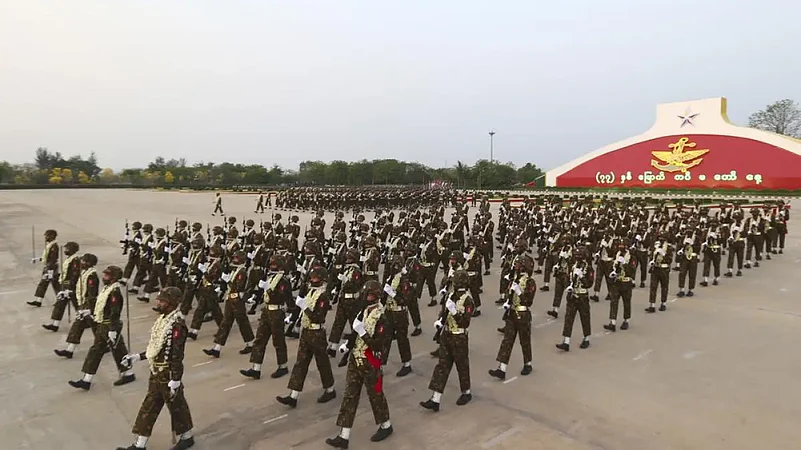Cocking a snook at the rest of the world, Myanmar's military junta has gone ahead and executed four political prisoners, two of them well-known opponents of the regime.
The junta’s brutal tactics in dealing with pro-democracy activists are well known, yet the execution of political prisoners is rare in this day and age. However, a nervous regime bent on cracking down on its own citizens wanted to send out a message to deter protesters. The ordinary people of Myanmar have shown remarkable courage in defying the army.
Since the February 1 coup last year, the military has killed over 1,700 people, including some 130 children, and arrested over 13,000 political activists. The generals are confident that there will not be a heavy price to pay for the executions. Not just China and India but the Association of Southeast Asian Nations (ASEAN) group as a whole have not imposed sanctions.
Advertisement
The world had given ASEAN the responsibility of dealing with Myanmar, but the peace-making efforts had stuttered from the start. ASEAN had come up with a five-point agenda that has neither stopped state violence nor brought the military and pro-democracy activists to the negotiating table. Yet the ASEAN effort gave the world a perfect excuse to shrug off the assault on democracy in Myanmar. The result is there for all to see. It has emboldened the generals.
India’s former Ambassador to Myanmar Gautam Mukhopadhaya said he was “shocked but not surprised”.
He added, “It shows that they are not amenable to change or reform. There will be a backlash.”
Advertisement
Both Phyo Zeya Thaw and Kyaw Min Yu were popular resistance figures — both were among the four prisoners executed. Phyo Zeya Thaw, a former lawmaker from Suu Kyi's National League for Democracy (NLD), was arrested in November and was sentenced to death in January for offences under anti-terrorism laws. He was charged with organising attacks on a train in Yangon that killed five policemen. He was a hip-hop artist known for his subversive anti-government lyrics and was jailed in 2008 under the previous military dictatorship. After he was freed, he contested the 2015 elections as a member of Aung San Suu Kyi’s NLD.
Kyaw Min Yu was part of Myanmar's 1988 student uprising against another of the many military regimes that have controlled the isolated nation since Independence. A strong pro-democracy activist, he had spent more than a dozen years in jail. He was arrested in an overnight raid in October. The two others who were also summarily executed are not as well known. They were sentenced for killing a women informer of the regime.
The execution is sending shockwaves across Myanmar and around the world. The United Nations, United States, and Europe have all condemned the execution. The question is beyond issuing strong statements, what else can the US and its allies do? With the West completely focused on the Ukraine War and bringing President Vladimir Putin to heel, the world has little time for Myanmar.
Advertisement
There is neither inclination nor the energy to uphold democracy in a country with little strategic interest to the US and its allies. The West has already slapped sanctions on Myanmar with little visible effect.
US President Joe Biden vowed that promoting democracy and human rights across the world would be a major goal of his administration. He held a Democracy Summit to spread the word.
“In the face of the sustained and alarming challenges to democracy and universal human rights around the world, more than ever, democracy needs champions,” Biden said in December 2021 when he held the first-ever Summit for Democracy in Washington.
Advertisement
Biden has not shown much commitment to either democracy or human rights unless it suits the US political agenda.
India certainly does not wish to take a strong stand against Myanmar’s military regime, much like China. New Delhi had lost out to China when India had stopped engaging with the generals the first time Aung San Suu Kyi was placed under house arrest. Narasimha Rao reversed that policy in 1992 for strategic considerations and began to engage with the military rulers. That policy has remained intact.
All of the ASEAN nations have business interests in Myanmar. Both private and state-run enterprises have continued to do business with the generals. The military controls several major business enterprises, including Myanma Oil and Gas Enterprise (MOGE), Myanmar Economic Corporation Ltd (MEC), and Myanma Economic Holdings Public Ltd (MEHL).
Advertisement
While China provides most of the arms to Myanmar’s military, the Philippines too was a major supplier right through 2017 when the crackdown on Rohingyas began. An Indonesian state-controlled company supplied guns to Myanmar. Brunei’s state-owned oil company invested in oil via military-controlled MOGE. Thailand has invested in gas. Vietnam invested in Mytel, a military-owned telecom company and Malaysia provides the telecom towers to Mytel. Singapore also provides financial services to companies linked to the junta. This is why the generals believe they can get away with impunity.




















